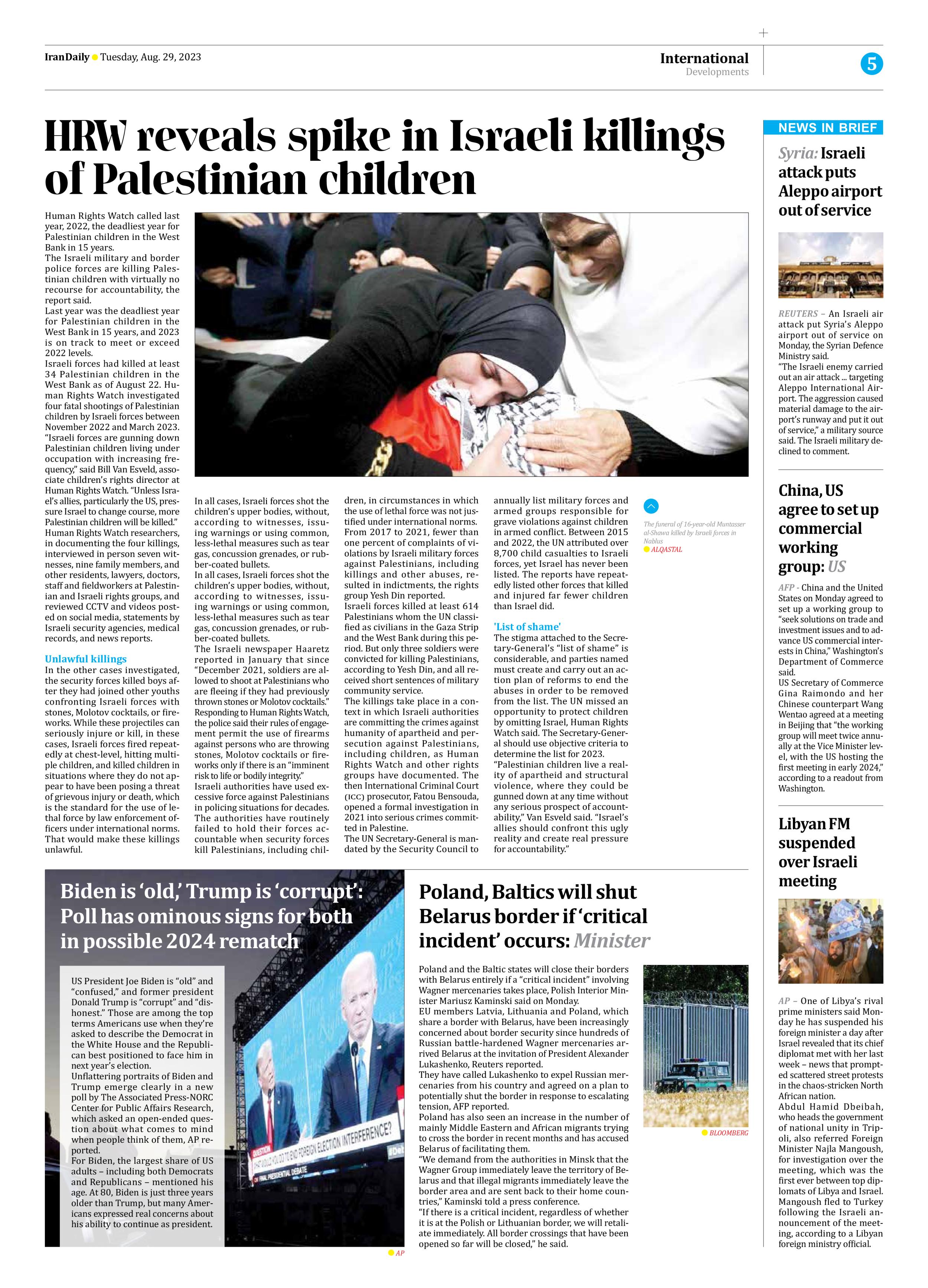
HRW reveals spike in Israeli killings of Palestinian children
Human Rights Watch called last year, 2022, the deadliest year for Palestinian children in the West Bank in 15 years.
The Israeli military and border police forces are killing Palestinian children with virtually no recourse for accountability, the report said.
Last year was the deadliest year for Palestinian children in the West Bank in 15 years, and 2023 is on track to meet or exceed 2022 levels.
Israeli forces had killed at least 34 Palestinian children in the West Bank as of August 22. Human Rights Watch investigated four fatal shootings of Palestinian children by Israeli forces between November 2022 and March 2023.
“Israeli forces are gunning down Palestinian children living under occupation with increasing frequency,” said Bill Van Esveld, associate children’s rights director at Human Rights Watch. “Unless Israel’s allies, particularly the US, pressure Israel to change course, more Palestinian children will be killed.”
Human Rights Watch researchers, in documenting the four killings, interviewed in person seven witnesses, nine family members, and other residents, lawyers, doctors, staff and fieldworkers at Palestinian and Israeli rights groups, and reviewed CCTV and videos posted on social media, statements by Israeli security agencies, medical records, and news reports.
Unlawful killings
In the other cases investigated, the security forces killed boys after they had joined other youths confronting Israeli forces with stones, Molotov cocktails, or fireworks. While these projectiles can seriously injure or kill, in these cases, Israeli forces fired repeatedly at chest-level, hitting multiple children, and killed children in situations where they do not appear to have been posing a threat of grievous injury or death, which is the standard for the use of lethal force by law enforcement officers under international norms. That would make these killings unlawful.
In all cases, Israeli forces shot the children’s upper bodies, without, according to witnesses, issuing warnings or using common, less-lethal measures such as tear gas, concussion grenades, or rubber-coated bullets.
In all cases, Israeli forces shot the children’s upper bodies, without, according to witnesses, issuing warnings or using common, less-lethal measures such as tear gas, concussion grenades, or rubber-coated bullets.
The Israeli newspaper Haaretz reported in January that since “December 2021, soldiers are allowed to shoot at Palestinians who are fleeing if they had previously thrown stones or Molotov cocktails.”
Responding to Human Rights Watch, the police said their rules of engagement permit the use of firearms against persons who are throwing stones, Molotov cocktails or fireworks only if there is an “imminent risk to life or bodily integrity.”
Israeli authorities have used excessive force against Palestinians in policing situations for decades. The authorities have routinely failed to hold their forces accountable when security forces kill Palestinians, including children, in circumstances in which the use of lethal force was not justified under international norms.
From 2017 to 2021, fewer than one percent of complaints of violations by Israeli military forces against Palestinians, including killings and other abuses, resulted in indictments, the rights group Yesh Din reported.
Israeli forces killed at least 614 Palestinians whom the UN classified as civilians in the Gaza Strip and the West Bank during this period. But only three soldiers were convicted for killing Palestinians, according to Yesh Din, and all received short sentences of military community service.
The killings take place in a context in which Israeli authorities are committing the crimes against humanity of apartheid and persecution against Palestinians, including children, as Human Rights Watch and other rights groups have documented. The then International Criminal Court (ICC) prosecutor, Fatou Bensouda, opened a formal investigation in 2021 into serious crimes committed in Palestine.
The UN Secretary-General is mandated by the Security Council to annually list military forces and armed groups responsible for grave violations against children in armed conflict. Between 2015 and 2022, the UN attributed over 8,700 child casualties to Israeli forces, yet Israel has never been listed. The reports have repeatedly listed other forces that killed and injured far fewer children than Israel did.
'List of shame'
The stigma attached to the Secretary-General’s “list of shame” is considerable, and parties named must create and carry out an action plan of reforms to end the abuses in order to be removed from the list. The UN missed an opportunity to protect children by omitting Israel, Human Rights Watch said. The Secretary-General should use objective criteria to determine the list for 2023.
“Palestinian children live a reality of apartheid and structural violence, where they could be gunned down at any time without any serious prospect of accountability,” Van Esveld said. “Israel’s allies should confront this ugly reality and create real pressure for accountability.”







